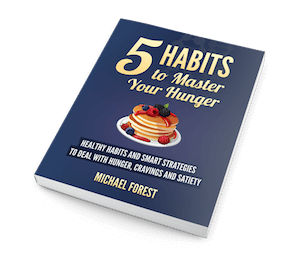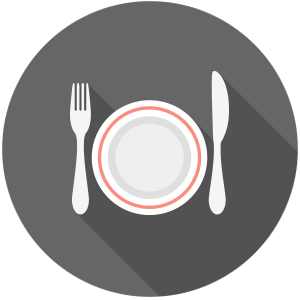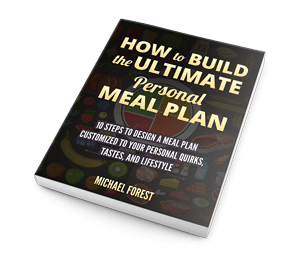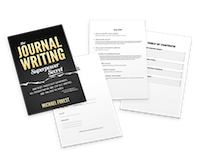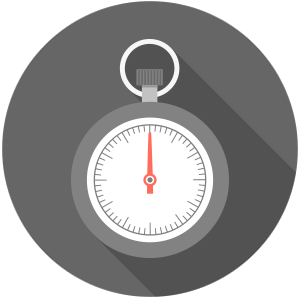
Both your brain and your stomach can be trained to *mostly* not be hungry when it’s not yet time to eat. This means it’s easier not to snack and munch on goodies if you know it’s not going to serve your goals.
It takes a few days, but it works surprisingly well.
This entire section can be boiled down to the following advice:
Habit 1a. Eat the same number of meals, at roughly the same times each day.
Habit 1b. Consider setting up a “feeding window.”
Eating the same number of meals, at roughly the same times each day works as a strategy for controlling hunger because by doing so, you will actually program your metabolism to “know” when it’s time.
This is because of a hormone called ghrelin.
Ghrelin gets released when your body thinks it is time to eat, and the release of ghrelin in turn makes you feel physical hunger. You get that empty rumbling sensation in your tummy.
Eating at the same times each and every day leads to what’s called hormonal entrainment. That is, your hormones (ghrelin) are “entrained” to know when it’s time to be hungry, and this is based simply on when you usually eat. If you always eat at noon, you always get hungry at noon. If you never ever eat between 1 p.m. and 4 p.m., you don’t get hungry at those times.
If you eat the same number of meals at the same times each day for about three to five days, you’ll have adjusted your internal metabolic schedule to pretty much only be hungry at those times.
This is why the old “eat three square meals a day” is actually pretty good advice; it encourages sticking to a general schedule. If you’re used to eating those three square meals, and you eat them at the same times—and you don’t snack in between—then you will have trained your body not to want food except at those set meal times.
That “not snacking” part is key. In order to stop wanting to snack, you need to suck it up for what amounts to a little less then a week. Do that, and at least in terms of hormonal entrainment, you won’t want to snack. (Specific habits and triggers might still need to be dealt with, but they will be much easier to deal with when your physical hunger is working for you instead of against you.)
You might think you’d still get mental cravings because you’re bored or because of environmental cues that trick your brain into wanting food. Yes, that is true, but even mental cravings, and your response to certain triggers, will be reduced if you’re not physically craving food. This is because:
- A lot of mental cravings begin as actual, physical hunger, such that in some way the “trigger” is the physical feeling of hunger.
- By following this advice you will also be training your brain and your mind to think about other things.
Again: the mental aspects and the physical aspects of hunger overlap and complement each other.
If you currently find you’re hungry in between meals, it might be because you’ve trained your body (your stomach and your mind) to expect food. If you snack at certain times, this is definitely the case.
Pretend you snack every day at around 3 p.m. because that’s when you take a break at work, and there’s a delicious cookie smell coming from the nearby cafeteria counter. All those environmental cues (the time, the routine of taking a work break, the smell itself) are making you hungry, and triggering signals in your brain that say feed me! feed me!
First, there is the habitual, psychological Pavlovian response to environmental cues (the smell of the cookies, the established “afternoon break” routine) that makes you crave food, but there is also the timed release of ghrelin in your stomach making you physically hungry.
And, for a grand finale, aside from already making you hungry, the release of ghrelin and the physical sensation of hunger will then in turn act as another trigger or cue activating and reinforcing the Pavlovian response in your brain.
The physical feeling of hunger is a habit cue making you more “mentally” hungry.
In short: it’s a double whammy. Again, this is how physiological hunger and mental cravings overlap; it’s not just one or the other. The body’s more complex than that.
But again, if you’re smart, and you can hold out for three to five days, you can train your body and your mind to not expect food at these times.
And again, the way to do this is simple, and this method aligns with basic common sense (always a good sign).
By avoiding snacks for just a few days (again, I’m talking 3-5 days here), you will train your body not to expect those snacks, and soon a bunch of the physical cravings will disappear.
A percentage of the mental ones will disappear or be dampened as well, since they are so interconnected with the physical ones. The mental ones will continue to lessen and lessen until they are gone. (You just have to tell yourself it’ll get easier, because it will. Really, that’s all it is.) Eventually the environmental cues telling you to snack will become environmental cues telling you to get back to whatever you were doing.
(You can also introduce new environmental cues, since it’s often easier when you add in some fresh ones. For example, you might work really well listening to a certain type of music. When you get hungry, turn on the music and get back to work. The music will not only serve as a cue to focus and work, but as a cue to ignore other things like hunger. Very soon, the original cue, the one that made you hungry, will be short-circuited, and turn into a cue to listen to music.)
As another takeaway, hormonal entrainment is why many people often advocate skipping breakfast or not eating in the morning. They restrict their eating to a shorter period, later in the day. This is one form of intermittent fasting, which I’m going to discuss, and then let you make a decision for yourself.
The research shows that eating many smaller meals – by itself – actually has no positive effect on metabolism in and of itself, at least not in that sense of “revving” your metabolism.[4]
What does seem to show a beneficial effect is “regular meal frequency,” i.e., doing what I recommend above and eating at the same times each day.[5] This is true whether you eat 1, 2, 3 or 6 meals every day. It helps with hunger, and it seems to have a positive effect on metabolism.
For many people, skipping breakfast is easier, and it allows you to do other things during that time without worrying about cooking or eating. It takes less planning. You will get used to not having to think about food during the first half of your day, which makes trains your brain to focus on other things.
I am not saying skip breakfast when you “feel like it.” To be clear: that's irregular meal frequency, and that's bad. It is likely to cause more hunger by jerking around with your ghrelin signalling.
I am saying that you consistently schedule your regular, normal meals to only begin at noon or 1 p.m. or something. There are a bunch of studies showing a correlation between skipping breakfast and obesity. But as we all know, correlation is not causation. I suspect that for the subjects, skipping breakfast was probably an irregular thing, and likely a sign that the person just wasn’t focused on their health, given that the message for so long has been to never ever skip breakfast.
Finally, having a not-full stomach, yet also feeling full of energy, puts you in a kind of “sweet spot” for mental acuity, and for whatever it is you need to get done (see Habit 4 below for more on the sweet spot).
You develop more productive habits the longer you do this and stick with it. Just as being hungry can become a mental trigger or cue for snacking, so too can a feeling of—well, if not “hunger,” at least non-fullness—be a trigger for getting in the zone and getting work done. (Again: more on this in Habit 4.)
I’ve done this myself, and have enjoyed great success with it.
However, I’ve also worked pretty closely with Scott Abel, and I have a great deal of respect for his opinions on nutrition, and he hates this idea. See this post. He thinks skipping breakfast is one of the worst things you can do, and hates all forms of IF more generally. He often links to these (excellent) lectures by Dr. Diana Schwarzbein.
I disagree, insofar as I think if it’s a regular habit, and your meal times are kept regular, then you’ll be A-OK. Not eating for a few extra hours each day (in addition to the “not eating you do” every single day when you sleep) won’t do any real harm. Your body will figure it out and adapt; that’s what it does best. Your body is not stupid, but it likes regularity and routine. This is why I’m not really a fan of irregular forms of fasting (e.g., a 24-hour fast “now and then”).
As I mentioned, there are some some pretty neat studies about the importance of breakfast. There’s one where subjects ate donuts and cake for breakfast, and ended up losing more weight long-term versus a control group and a low-carb breakfast group (but no dieters who just practiced regular fasting). The carbs-at-breakfast group also enjoyed greater satiety, which is worth noting. So, if you do have breakfast, eat carbs (with a protein). I’m actually really not a fan of low-carb for satiety, though this puts me in opposition to a good chunk of the Internet it seems. I sent this study to Scott–he loved it. [6]
On the flip flip side, Martin Berkhan presents a perspective on the myth of breakfast here. (Scroll down to number 7.)
It’s easy.
Just pick some set meal times. Eat two, three or four meals a day within a set feeding window. You still try to eat at generally the same times each day. Most people begin their window around lunchtime, and end it around dinner. (Yes, you can still totally eat breakfast foods in the middle of the day if that’s your thing.)
I’m going to suggest a daily feeding window of roughly 8 hours. Martin Berkhan’s Leangains approach popularized what he calls a “16/8 feeding window” as a form of “intermittent fasting,” [7] which is getting more and more popular.
What a “16/8 feeding window” means is you do not eat for 16 hours, and then you eat your scheduled meals within that 8-hour feeding window. For example, you might have a meal at 1 p.m., and then have a second meal sometime shortly before 9 p.m. (8 hours later). Or three meals total, say at 1 p.m., 4:30p.m., and 8:30 p.m.
By doing this, you are training your body, your metabolism, and your brain to never be hungry outside of that window.
On his (excellent) website, Berkhan has a lot of studies about the benefits of fasting, but honestly, as he himself will tell you: it’s not magic. There’s no magic metabolic super boost, but it is a smart, strategic approach when you look at it from the perspective of lifestyle and sustainable eating habits.
I think the biggest benefit is simply the synergistic relationship between these things:
- The hormonal entrainment of ghrelin.
- The way this strategy also takes advantage of how normal habits work. (I.E. you train your hormones and your brain not to think about eating outside the window.)
- The real-life ease of the approach, since you only need to worry about eating for a short time period each day. For the rest of the day, it’s just not on your mind. In short, you get more work done.
You might be experiencing a bit of resistance to the idea if you haven’t encountered it before.
“How can I avoid eating for 16 hours and not get hungry or think about food? That’s crazy.” I know it sounds that way. I felt the same way until I tried it. I, and others, have found it is surprisingly easy after the first three days or so.
Also note that “fasting” for 16 hours only sounds difficult because of the word “fasting.” I don’t like the word “fasting” because what I’m describing gets confused with other forms of fasting (all-day fasts, that kind of thing). For what I’m describing, you have hormonal entrainment on your side. And half of that so-called “fasting” time is taken up by sleeping.
Ever skipped a single meal? That’s basically what this boils down to. You’ve probably done it many times without even noticing, and during those times you didn’t even have hormonal entrainment on your side.
The benefit is that when you do eat three or four meals instead of five or six, you do eat larger meals, so you experience a greater feeling of fullness.
If you want to try this, start with the 16/8 window. The most important thing is that whatever you do, you do it every day, and make sure the meals you do have come at regular meal times. Don’t snack.
An 8-hour feeding window is a good starting point, because it allows lunch and dinner, with possibly a third meal in between if you feel like it, and maybe a pre-bed meal. (Often dinner serves for this, though.)
“I don’t wanna try intermittent fasting! It’s a dumb fad!”
Cool. I very much agree that IF has become a fad, and very overhyped in some places.
These things come and go. Now carbs are good, now bad. Fasting is now good, now bad. For a long time, whether or not eggs were good or bad seemed to go back and forth depending on what day of the week it was. (Which is silly, by the way. Eggs are good.)
But I also believe intermittent fasting has got some intelligent thinking and some solid science behind some of its more basic precepts, and I’m using them. Babies and bathwater, etc.
I don’t even really like the label “IF,” but to talk about a 16/8 window without mentioning Berkhan would just be plain dishonest. (Also: to be clear, I consider Martin Berkhan one of the good guys.)
- Maybe one of the best parts of your day is eating breakfast with your kids or partner, right before work each morning. That’s a darn good real-life reason to me.
- Starting your morning routine with making yourself breakfast might also be an important part of getting yourself together in the morning. Starting your day off – right when your willpower is highest – with a planned diet meal, and even a bit of “me time,” is a great way to get an early “quick win” and start a cascade of good habits for the day ahead. If you don’t want to get rid of that, then don’t. I used to be this way; now that I have a dog, our morning walk is that “me time” (my dog doesn’t talk much) where I organize my thoughts and get my morning quick win. (And making breakfast before he’s had his walk is kind of a pain, and just doesn’t feel like a “win” so much as a delay before the real win: his walk.)
- Or, maybe you just found 5-6 meals per day work wonders for you. Whatever. I say do what works for you, not what works on paper.
- Finally, I'm also on the fence about IF for muscle gain.
However, with that said, I will say that you should definitely restrict your eating to *roughly* the same meal times each day, and avoid snacking. This will help.
This is true if you eat 3, 4, 5 or 6 meals a day. Try to keep them at the same times, because snacking in between them now will make it harder to avoid snacking in between in the future.
Enjoying the Guide?
Get the Revised and Expanded Edition (available now on Amazon)
New Sections
3 Key Principles (...About Your Hunger and Cravings)
"Am I In the 'Sweet Spot' of Hunger?" Assessment Guide
8 Factors Affecting Your Ability to Assess Your Own Hunger
"Do I Need a Cheat Meal?" Assessment Guide
Introduction.
Dealing strategically with hunger, cravings, and metabolic compensation.
Habit 1.
Eat in such a way that you train both your stomach and mind to only be hungry when it’s time to eat.
Habit 2.
Pick (and combine) foods that satiate YOU.
